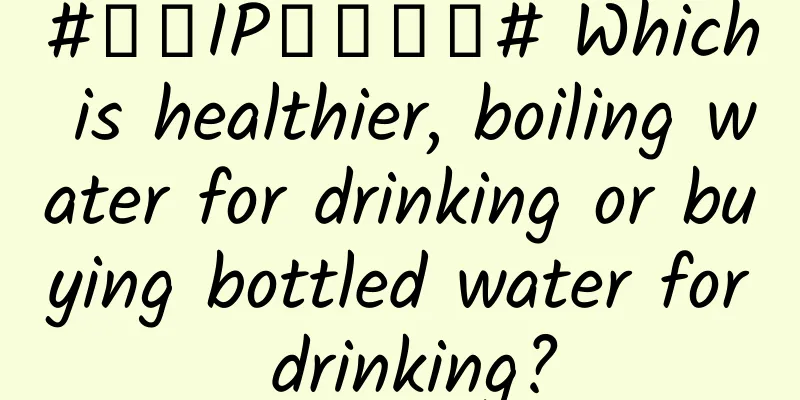#千万IP创科学普# Which is healthier, boiling water for drinking or buying bottled water for drinking?

|
What is a day in the life of a worker like? A cup of coffee in the morning to start the day Plastic cup Someone left a message in the background saying Seeing "microplastics" in bottled water … So here comes the question Boil water for drinking VS buy bottled water for drinking Which one is healthier? Let’s watch together Are there any health risks from drinking bottled/barreled water for a long time? According to a study published in the Proceedings of the National Academy of Sciences (PNAS), there are an average of 240,000 detectable plastic particles per liter of bottled/barreled water. Using optical imaging technology, researchers can observe "nanoplastics" (plastic particles smaller than 1 micron) in bottled/barreled water. These "nanoplastics" can pass through intestinal or lung cells, enter the blood, and even reach the heart and brain. ▲Image source: New England Journal of Medicine The study also found that when bottled water bottles are squeezed or exposed to high temperatures, plastic particles may fall into the water as fragments fall off. Even when the bottle cap is repeatedly opened and closed, many plastic particles will enter the water. There are also "microplastics" in tap water. According to the "Microplastics in Drinking Water" analysis report released by the World Health Organization, plastic pollutants exist in the ocean, sewage, fresh water, and drinking water (including bottled water and tap water). (You can be cautious, but there is no need to be overly nervous.) Although there is currently no research that can confirm the specific harm of microplastics to the human body, based on research on animals, it is necessary to reduce the intake of microplastics. Boiling water can reduce microplastic intake According to a study published in Environmental Science and Technology Express, during the process of boiling water, as the water temperature rises, the removal efficiency of microplastics in the water gradually increases , and sharply increases to 84% at 100°C. At the same time, the concentration of microplastics decreased from the original 30 particles/microliter to 4.8 particles/microliter. The study also found that the amount of microplastics ingested by boiling water every day is 2-5 times less than the amount of microplastics ingested through tap water. The calcium and magnesium ions in tap water will form scale after the water is boiled and settle to the bottom of the water. During the scale formation process, the calcium and magnesium ions will pull the microplastics down and "lie flat" together. Boiling water is a simple and harmless way to "purify" it, which can effectively reduce the intake of microplastics through drinking water. (Don't pour boiled water into plastic containers...) Bottled water vs. boiled water There is actually no absolute answer to the question of whether boiling water or drinking bottled water is healthier. It mainly depends on the local water quality and personal living habits. If you boil your own water , you can ensure the safety and hygiene of the water source. By boiling water and using filters, we can effectively remove bacteria, viruses and most microplastic particles in the water. At the same time, boiling your own water can save money and reduce pollution to the environment. However, if the local water quality is poor and contains too many heavy metals or other contaminants, drinking bottled water may be a safer option. When choosing bottled water, we should choose reputable brands, pay attention to check the integrity of the bottle, and avoid buying inferior products. No matter which method we choose, we should remain vigilant and pay attention to the safety and hygiene of the water source. At the same time, we can also try to use a water purifier or install a tap water filtration system to further improve the quality of drinking water. How to drink water more healthily? 01. Drink water, choose the right one, not the expensive one When you go out, you can bring boiled water in a portable cup or kettle. If you need to buy it outside, ordinary bottled water at 2 yuan a bottle is enough. Just choose the right one, not the expensive one. 02. Drink water in moderation my country's dietary guidelines recommend that the average adult drink 1500-1700 ml of water every day. This is the recommended amount, and you can adjust it according to your own situation. For example, when you exercise a lot and sweat a lot, you should drink more water. 03. Drink water in small amounts and multiple times Don't drink water only when you feel thirsty. You should consciously drink water actively, in small amounts and multiple times. Especially for the elderly, who are not sensitive to water, they need to replenish water in time. 04. In special circumstances, pay attention to drinking more water, and you can choose electrolyte water People who do strenuous exercise, have high fever and diarrhea, have urinary stones, hyperuricemia, gout, and diabetes should drink more water, and can choose electrolyte water under the guidance of a doctor. People who work in a high temperature environment should drink more water appropriately, and can choose electrolyte water containing potassium, sodium, etc. |
<<: Washing your face with white vinegar can whiten your skin and make it smooth and delicate
Recommend
Why is it not advisable for people with high blood pressure to drink onion red wine for a long time? How long is the shelf life of onion red wine?
In theory, soaking onions in red wine can relieve...
How long will it take to give birth if the fingers are eight apart?
When a pregnant woman is about to give birth, if ...
What foods can replenish qi and blood? These foods help women replenish qi and blood!
For most women, replenishing qi and blood is a ve...
Diabetes and obesity
The relationship between diabetes and obesity Man...
Reasons for missing menstruation for four months
Many gynecological diseases occur frequently in d...
How do breast cysts form?
Breast disease has also become a disease that mor...
Causes of Thick and Dark Menstrual Blood
When women are menstruating, if they experience a...
The benefits of sweating while running in summer
Sweating during running is very valuable, because...
Cardiologists remind: These symptoms are signs of blood vessel blockage and thrombosis! This is how to prevent
Vascular blockage is a very serious disease. Some...
The recent state of northerners: I haven’t been to the south, but I can feel the “humidity and heat” of the south…
□ Popular Science Times reporter Chen Jie and Hu ...
Can I eat chicken during my period?
Can you eat chicken during menstruation? This is ...
Can I eat fennel seedlings when I am pregnant?
Diet is closely related to our lives. For some or...
What is the reason for menstrual disorders after abortion?
If abortion is not done properly, it can easily l...
How can girls have body odor
There is no girl who doesn't want to smell sw...
Detailed explanation: Six major hazards of kidney deficiency in women
Once a woman suffers from kidney deficiency, she ...









